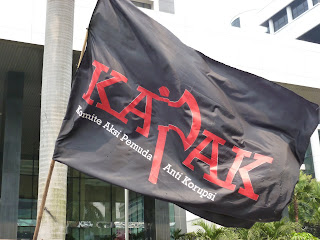It turns out that the protestors were upset with Indonesian president Susilo Bambang Yudhoyono (SBY), vice-president Budiyono, and former finance minister Sri Mulyani over their alleged involvement in a scandal known as the Bank Century affair. I'm quite interested in Indonesian politics and current events, and so I decided to ask around as to what was up. After all, Sri Mulyani, who is currently managing director at the World Bank, is widely regarded as a brilliant economist of unshakeable integrity and a possible candidate to be the next president of the Republic of Indonesia. Sri Mulyani's straightforward manner has won her the respect of Indonesia watchers around the world, so I was curious to learn about her "dark side", because up until now all I've heard is good things about her.
 So I asked some of the several hundred protestors that had been bussed in to central Jakarta for the occasion. All the protestors were young folks, and so at first I thought they might be college students. "What's going on here? Why are you guys upset with Sri Mulyani for?"
So I asked some of the several hundred protestors that had been bussed in to central Jakarta for the occasion. All the protestors were young folks, and so at first I thought they might be college students. "What's going on here? Why are you guys upset with Sri Mulyani for?""Because she's a corruptor!" came the answer from several different people.
My efforts to ask the question in several different ways, along with my prodding for elaboration ended in vain. So I tried a different angle. "What do you guys want the KPK to do about it?"
"We want her brought down!" was the standard response.
"But you know she's at the World Bank now, right? The KPK doesn't have any influence over the World Bank," I argued.
"BUT SHE'S A CORRUPTOR!" was the only rebuttle. And then I noticed something. In addition to not knowing much about the issue at hand, all of the young people were men. And then I realized that this wasn't a protest at all, but rather an engineered political statement designed to resemble a protest. This ersatz mass-movement is a common tactic in Indonesian politics, where popular discontent is a powerful tool, especially since the fall of strongman president Suharto in the late 90s. These protest literally employ young men to shout slogans and carry inflammatory signs designed to impugn the character of whoever is the subject of the protest. Protestors are paid around 30,000 rupiah (around $3.50) and are offered a free lunch for their participation. This particular protest was organized by a political organization that shall remain nameless.
It was a pretty interesting thing to watch. The paid protestors even offered me some lunch, but I refused since I'd already had my fill of rice and chicken sinews for the day. We sat around shooting the breeze. They were obviously in it for the food and the money, so I wasn't going to learn much about the allegations against Sri Mulyani. So we talked about other things.
Keith: "Mana cewek?" (Where are the chicks?).
Protestors: "Di Mall..." (at the mall...).
All: "HAW HAW HAW!" (Haw Haw Haw).
 What made the day most interesting is that yesterday, on the flight from Singapore to Jakarta, I sat next to an Indonesian civil servant who had worked for 15 years as a banker specializing in international finance. He told me about some of the intricacies of the Century Bank imbroglio (which are far too detailed and boring to get into here) and how difficult the whole thing is for your average Bambang to understand. We then got into a discussion about how dangerous ignorance can be in a democracy. We both agreed that lots of folks are swayed by simple explanations for incredibly complex problems, which makes the ultimate resolution of such problems that much harder to achieve. It made me realize how blessed I am to live in a country where all the people are well informed when it comes to complex issues such as the national debt, taxation, and global warming. It's because of this that we're able to elect leaders that do such a good job working together for the benefit of everyone!
What made the day most interesting is that yesterday, on the flight from Singapore to Jakarta, I sat next to an Indonesian civil servant who had worked for 15 years as a banker specializing in international finance. He told me about some of the intricacies of the Century Bank imbroglio (which are far too detailed and boring to get into here) and how difficult the whole thing is for your average Bambang to understand. We then got into a discussion about how dangerous ignorance can be in a democracy. We both agreed that lots of folks are swayed by simple explanations for incredibly complex problems, which makes the ultimate resolution of such problems that much harder to achieve. It made me realize how blessed I am to live in a country where all the people are well informed when it comes to complex issues such as the national debt, taxation, and global warming. It's because of this that we're able to elect leaders that do such a good job working together for the benefit of everyone!On a lighter note, below I've included the picture of the day. This photo is of Moon Base Epsilon, which, due to the failure to carry a one in complex orbital calculations, actually ended up being constructed in Jakarta.







